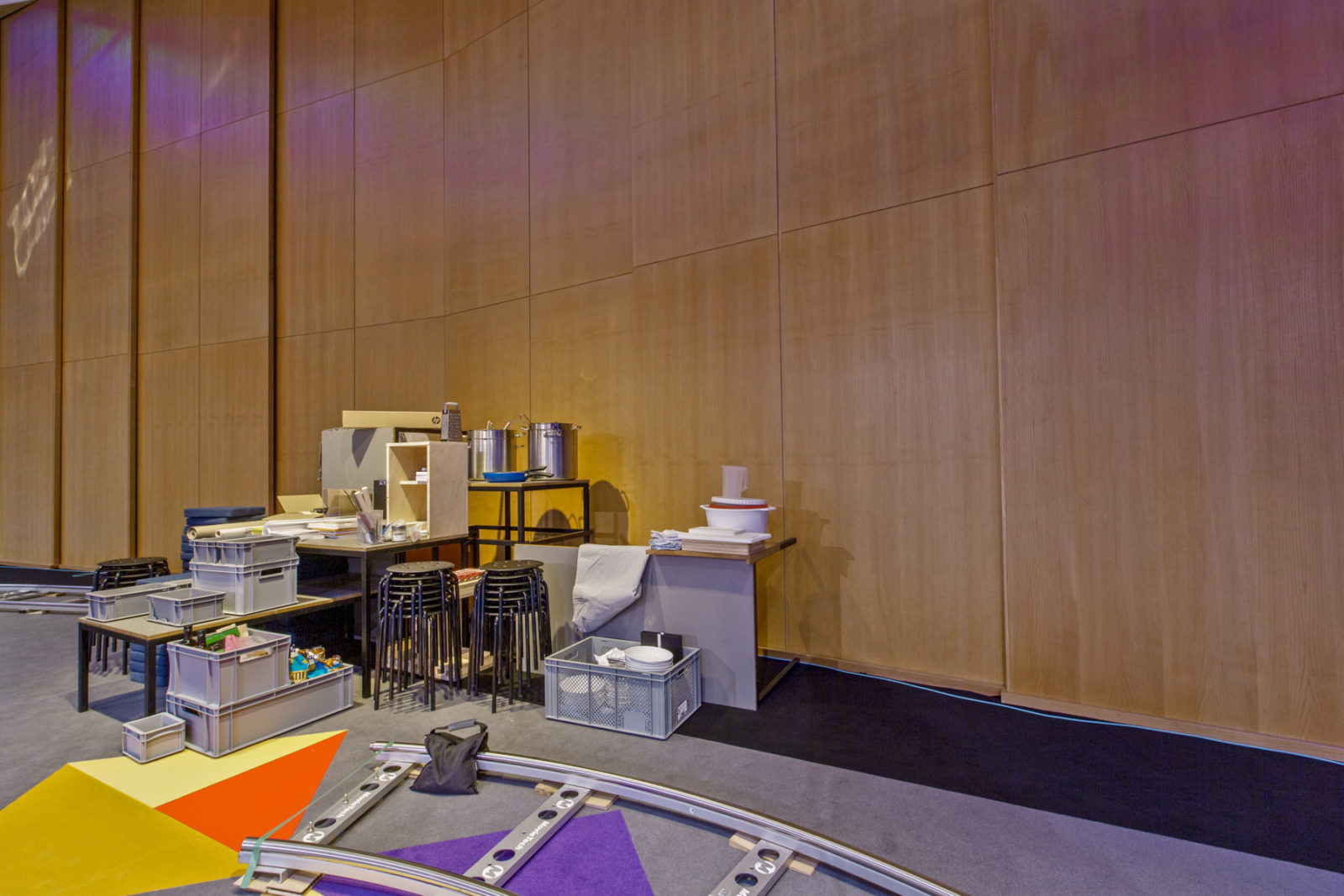- Ravi Agarwal
- Mohammad Al Attar
- Jamie Allen
- Lisa Baraitser
- Paul Boshears
- Maria Chehonadskih
- Shadreck Chirikure
- Myung Ae Choi
- L. Sasha Gora
- Orit Halpern
- Nina Jäger
- Valentina Karga
- Lital Khaikin
- John Kim
- Francine M.G. McCarthy
- Margarida Mendes
- Claire Pentecost
- Jahnavi Phalkey
- Patricia Reed
- Nishant Shah
- Adania Shibli
- Fernando Silva e Silva
- Rebecca Snedeker
- Nikiwe Solomon
- Jenna Sutela
- Koki Tanaka
- Simon Turner
- Mark Williams
- Mi You
- Gary Zhexi Zhang
- Kai van Eikels
Where is the Planetary? Day 2
On the second day of Where is the Planetary?, the search for a common planetary practice became tangible. The five research questions were linked to a series of activities. The idea of a “primordial broth” served as inspiration for a jointly designed recipe for the conditions of planetary habitability. By accumulating and recomposing ideas and material from cultural production and the built environment, participants posed questions about what needs our care, what should be preserved, and what should be left behind. Equitable, scalable processes of negotiation and deliberation were discussed into literal exhaustion. Collaboratively, participants wrote a sort of planetary script. All of this happens embedded in a film shoot led by Koki Tanaka. The running camera co-determined the course of the day.
Facilitated by L. Sasha Gora
With Shadreck Chirikure, Patricia Reed, Fernando Silva e Silva, Simon Turner, Mi You
“Mock Soup,” “Red Beans and Ricely Yours” and “Bastard Borsch”: this group tackled questions of planetary habitability through culinary cooperation. The simple question of to what extent different recipes may or may not successfully combine into one opened up space to discuss a seemingly unsolvable problem: How can we foster effective planetary collaboration despite differences, antagonisms and unequal historical responsibilities?
Facilitated by Gary Zhexi Zhang
With Larissa, Jahnavi Phalkey, Nikiwe Solomon, Jenna Sutela, Mark Williams
Measurement is riddled with assumptions. Any attempt to assess or qualify how habitability is ascertained or evaluated always carries political ideologies, disciplinary hang-ups and cultural perspectives. This Episode explored forms of measurement and the worlds they measure through a discussion punctuated by second-order reflections facilitated by a therapist. The aim was to heighten and escalate awareness of the distance between different concepts, perspectives and positions.
Facilitated by Koki Tanaka, Lisa Baraitser
With Mohammad Al Attar, Orit Halpern, Valentina Karga, Margarida Mendes, Nishant Shah, Simon Turner
What are the bodily, social and psychic preconditions for creating possibilities of repair? This group enacted an intimate exercise of sculptural practice and reflection. Transforming ideas of “work” as they collectively “worked with” problems of maintenance and care, participants built and rebuilt an object assemblage that spanned several meters—paying care-ful attention to the atmosphere around them and the materials in their hands. The patience to begin again and again remained a priority, even when such repair aims at world-spanning ecosystems and the planetary limits we have repeatedly breached in the global era.
Facilitated by Kai van Eikels
With Maria Chehonadskih, John Kim, Francine McCarthy, Adania Shibli
What are the strengths and weaknesses of our bodies in terms of making collective decisions? How can embodied knowledge help us change the fate of this planet without recourse to sovereign power? Can we decide things together through forms of debate and assessment of vital questions that are based neither on consensus nor on dissensus but rather on making us move along the line(s) of a different, more constellative We? And how can such a collective dynamic that emerges between some of us be translated to a planetary scale? The groupl tried out a series of corporeal practices that challenge established habits of decision-making, until the point of exhaustion—and beyond, because fatigue may not be the end but rather the starting point of a new ecological-political movement.
How do we tell planetary stories? Coming soon
Facilitated by continent. (Jamie Allen, Paul Boshears, Nina Jäger, Lital Khaikin, Anna-Luisa Lorenz)
With Ravi Agarwal, Myung-Ae Choi, John Kim, Margarida Mendes, Claire Pentecost, Fernando Silva e Silva, Rebecca Snedeker, Nikiwe Solomon
The shortest distance between two points is often the most unbearable path to take, and slower might be the fastest way to get “there.” Many stories of scarcity and strife impel us toward callous growth and rapacious progress. Certain narratives of the Anthropocene presume dominion of this planet and its plenitudes—yet such (post)scripts are composed too hastily. Presenting a durational intervention for Where is the Planetary?, the experimental publishing collective continent. worked through the practice of détente. This group of artists, technologists, designers and editors proposed détente as a rest, pause, or expectant repose that occurs, creates, and accommodates. Malleable and anticipative, could the delayed entanglement of détente suggest adaptive otherways—other stories that are otherwise?

